Every eCommerce solution, whether all-in-one or pieced together, has its pros and cons. The best enterprise eCommerce platforms should handle high sales volumes, scale your business, ensure data security, and streamline the customer experience.
So, which is the best eCommerce platform for enterprises? We’ve chosen the top 8 for your selection with detailed reviews:
- Shopify Plus
- Salesforce Commerce Cloud
- BigCommerce Enterprise
- Adobe Commerce
- Woo Enterprise
- Oracle Commerce
- commercetools
- SAP Commerce Cloud
Let’s get started now!
Seamlessly Migrate Your Online Store With LitExtension
Our team of experts can safely transfer your business data, products, customers, and orders to unlock more growth on the new eCommerce platform. Let us provide a customized migration for you!
An Overview of Enterprise eCommerce Platforms
Small and medium-sized businesses have a plethora of platforms available to them. However, this doesn’t work the same for large enterprises.
With larger companies, brand integrity is paramount, and fulfilling precise needs is imperative. And these all start with a trustworthy enterprise eCommerce platform.
What is an enterprise eCommerce platform?
As its name suggests, an enterprise eCommerce platform is a software tailored to large businesses. It enables businesses to reduce manual work and focus on strategic endeavors such as enhancing products and services for customers.
For this reason, the feature sets are exclusively optimized with advanced automation. They will cover all aspects of a business operation, including order fulfillment automation, inventory management, customer relations, marketing, payments, etc.
Benefits of using eCommerce platforms enterprise
Once your business begins to expand, it becomes even more crucial to migrate to an enterprise-level eCommerce solution. This will allow you to effectively manage the increased volume inherent in your everyday operations.
Why do we say that? These benefits will clearly explain our statement:
- Scalability
Enterprise eCommerce platforms aren’t designed only for managing high traffic but also for handling the growing user numbers, product catalogs, and order volumes as businesses expand. This is the exclusive benefit that distinguishes them from standard pricing packages.
- Performance
As your website receives more users than ever, the loading speed must be maintained to avoid disrupting the customer experience. The solution to this is an enterprise commerce platform that always ensures fast page loads and inventory retrieval.
- Multi-channel selling
Instead of one single selling channel, enterprises usually run multiple sites for B2B, B2C, and C2C at once. Enterprise-level eCommerce platforms can manage numerous websites utilizing a shared inventory or dropshipping list, facilitating multi-channel or omnichannel commerce.
- Security
The more transactions an enterprise processes, the more challenges it faces regarding PCI compliance and data security management. If you lack expertise in achieving PCI compliance or prefer not to undertake the task manually, consider choosing enterprise-level ecommerce software that handles PCI compliance on your behalf.
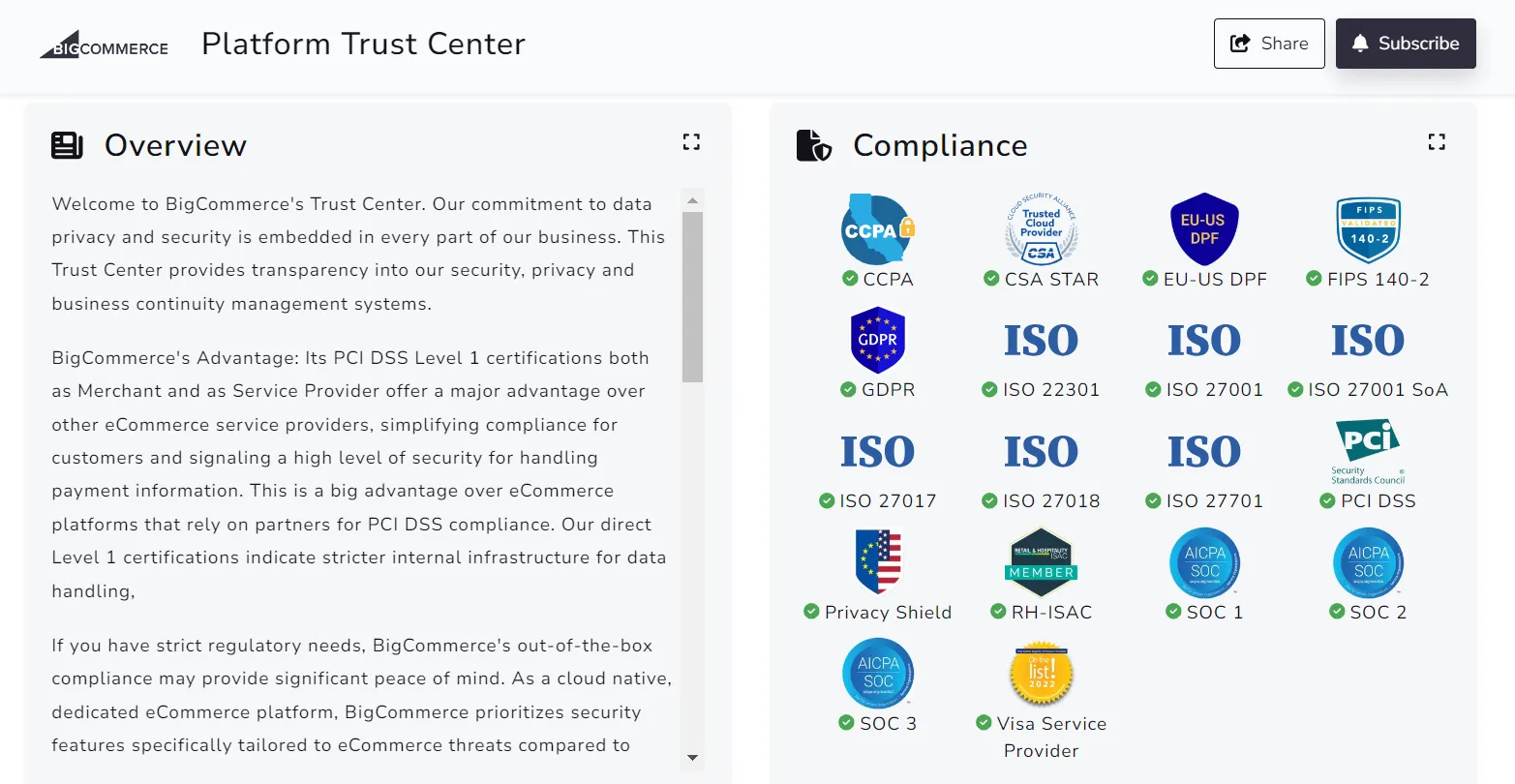
- Integration
An eCommerce enterprise platform provides outstanding integrations, applications, and API choices. These allow you to tailor your store and access the necessary features.
Types of eCommerce Enterprise Platforms
Before delving into specific options, let’s explore the overarching categories that encompass all these solutions. There are 5 main types of enterprise eCommerce platforms:
1. SaaS
Multiple eCommerce businesses choose SaaS, or software as a service. This is due largely to its user-friendly nature.
This type of platform is often called an “all-in-one” system, covering a range of online operations. They provide hosting, security, payment gateway support, PCI DSS compliance, CRM, data management, and backups. SaaS platforms also offer CMS for website design, product pages, and lead management software for better organization.
Popular platforms: Shopify, Salesforce, BigCommerce, Volusion, etc.
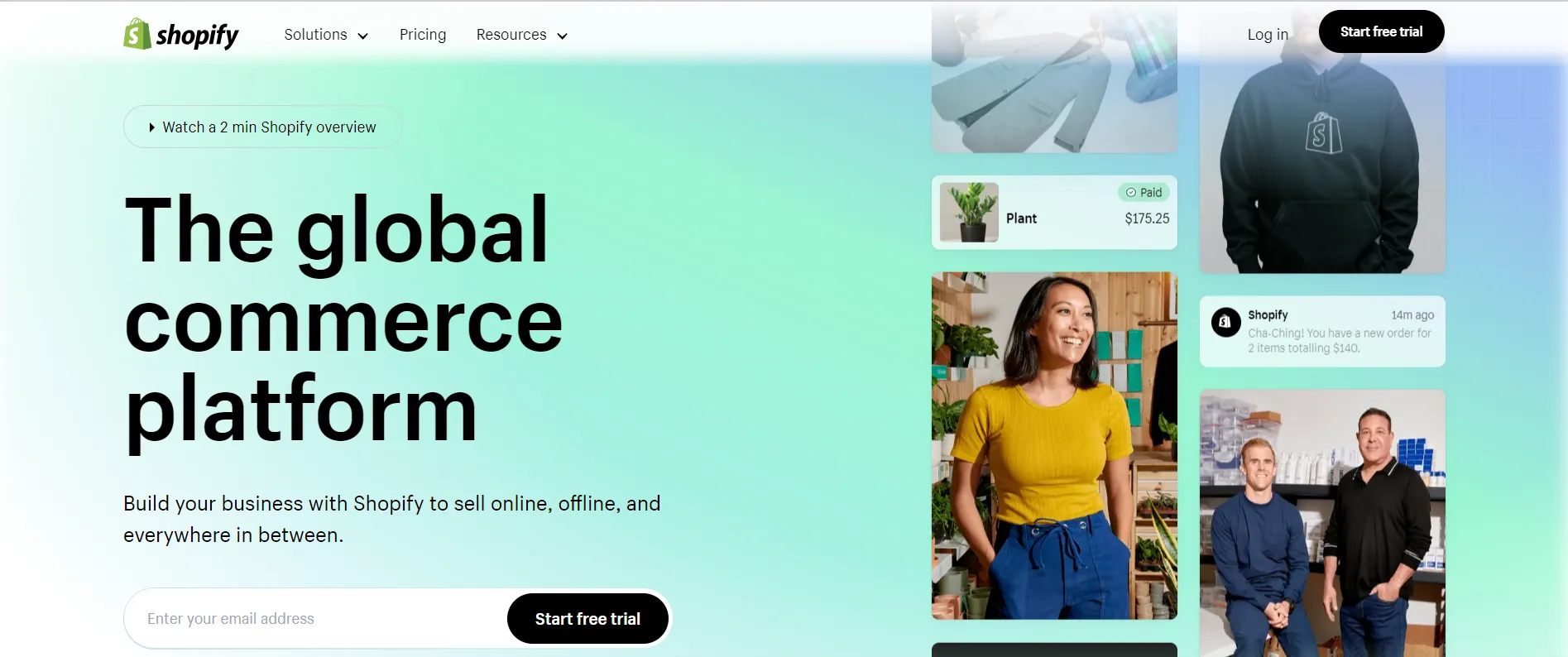
2. Self-hosted
Open-source or on-premise enterprise eCommerce platforms are accessible to everyone and available for free download and use. Your development team has full control over the source code, providing greater flexibility.
However, extensive coding skills are required to install comprehensive functionality, especially for enterprise websites. Additionally, be aware of the expenses, including license, design, hosting, maintenance, and PCI compliance.
Popular platforms: WooCommerce, PrestaShop, Joomla, etc.
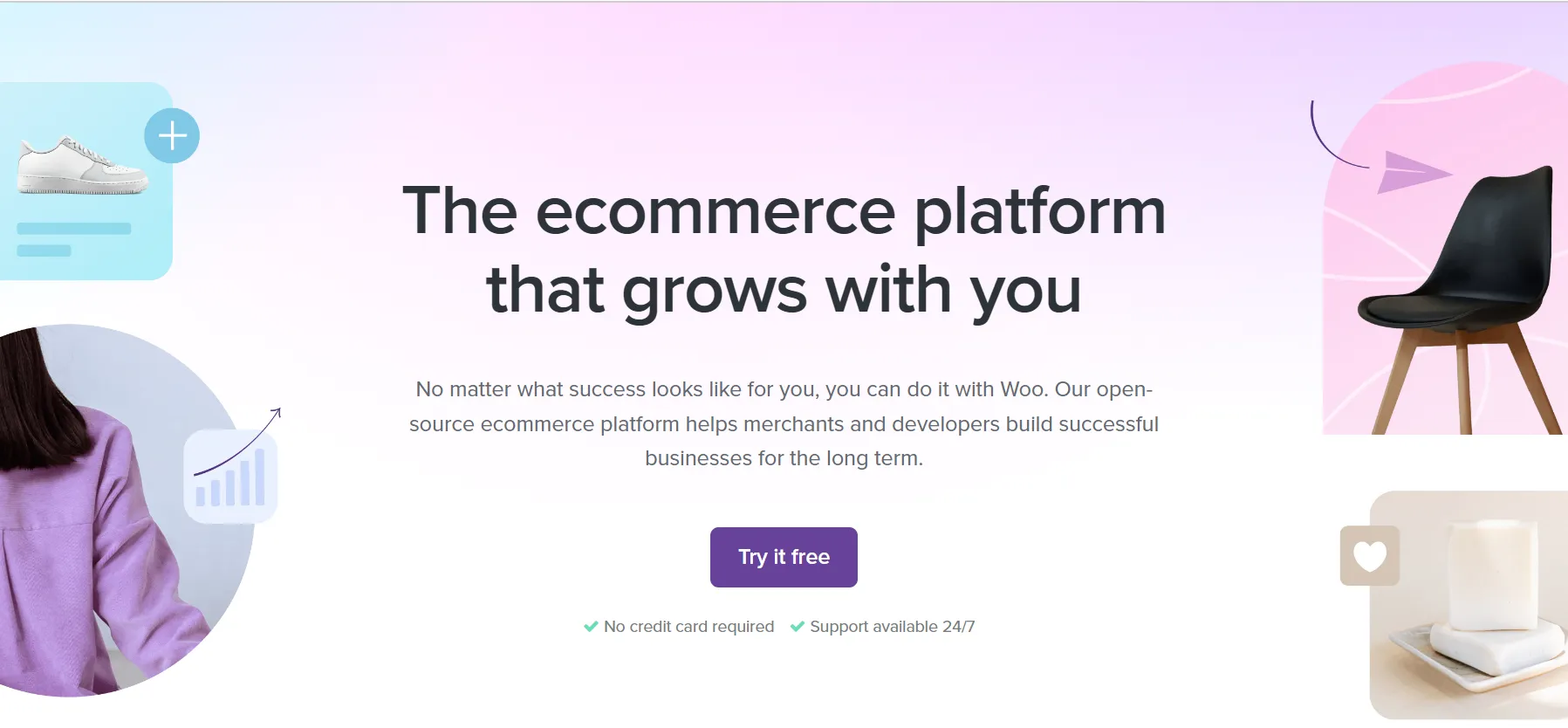
3. Cloud-based
Enterprise eCommerce platforms that are cloud-based minimize the necessity for server investments. At the same time, they also provide automatic backups across various locations for site data, analytics, and inventory.
Additionally, cloud hosting offers additional security options managed by the hosting service, enhancing the security structure of the enterprise eCommerce business.
Nevertheless, you should be aware of the price when choosing a cloud-based enterprise eCommerce platform. The expense arises due to the need for a technical team to develop and upkeep the infrastructure over the long term.
Popular platforms: Adobe Commerce (Magento), Salesforce Commerce Cloud, Oracle, SAP Commerce Cloud, etc.
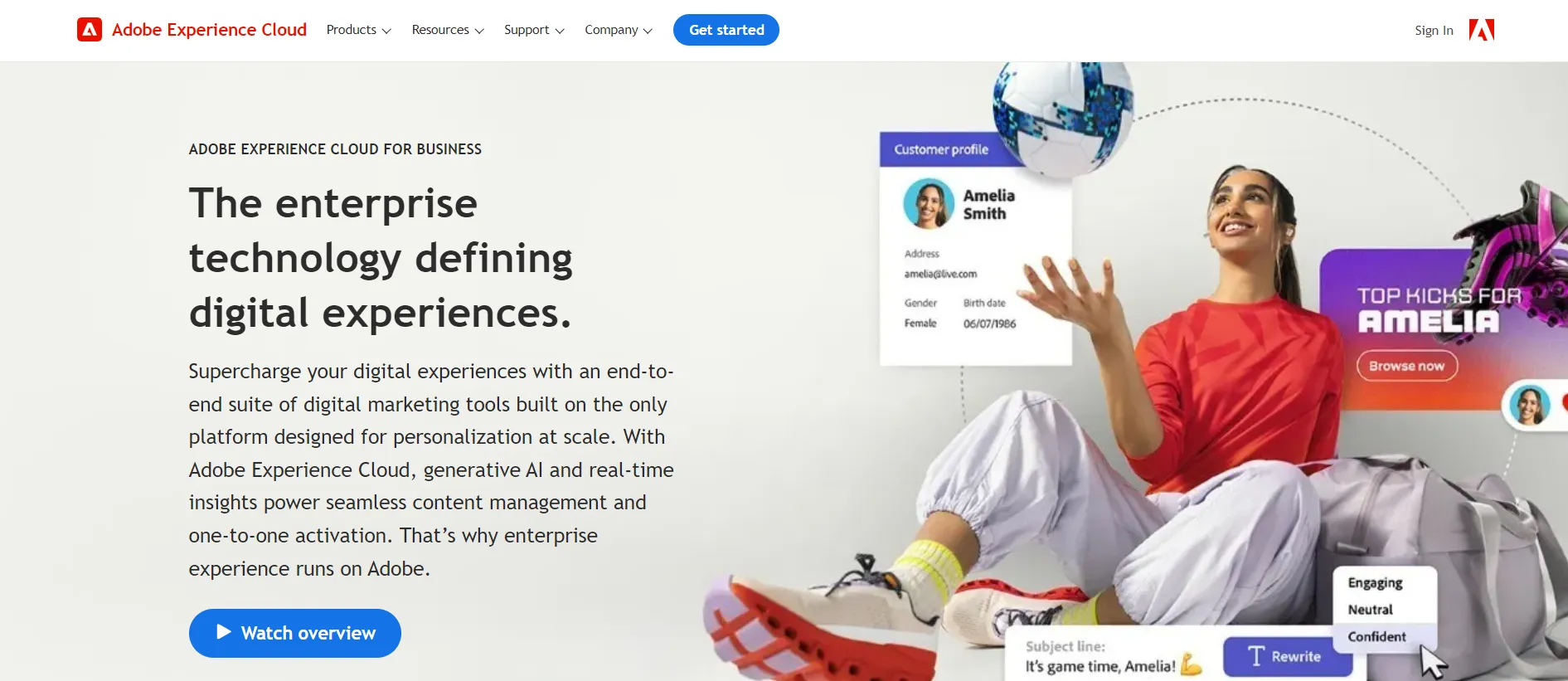
4. Headless
At first glance, headless eCommerce platforms, akin to SaaS models, share similarities in enterprise eCommerce functions like security, PCI DSS compliance, and inventory management.
However, this “headless” setup separates the front end from the back end, allowing for independent customization. While the back end can remain complex, the front end can be tailored separately, ensuring a seamless customer experience.
For instance, brands have the option to employ a digital experience platform (DXP) such as Uniform and Bloomreach, or a content management system (CMS) like WordPress or Contentful. They can then integrate a standalone eCommerce shopping cart solution as needed.
Popular platforms: Shopify Plus, BigCommerce, commercetools, etc.
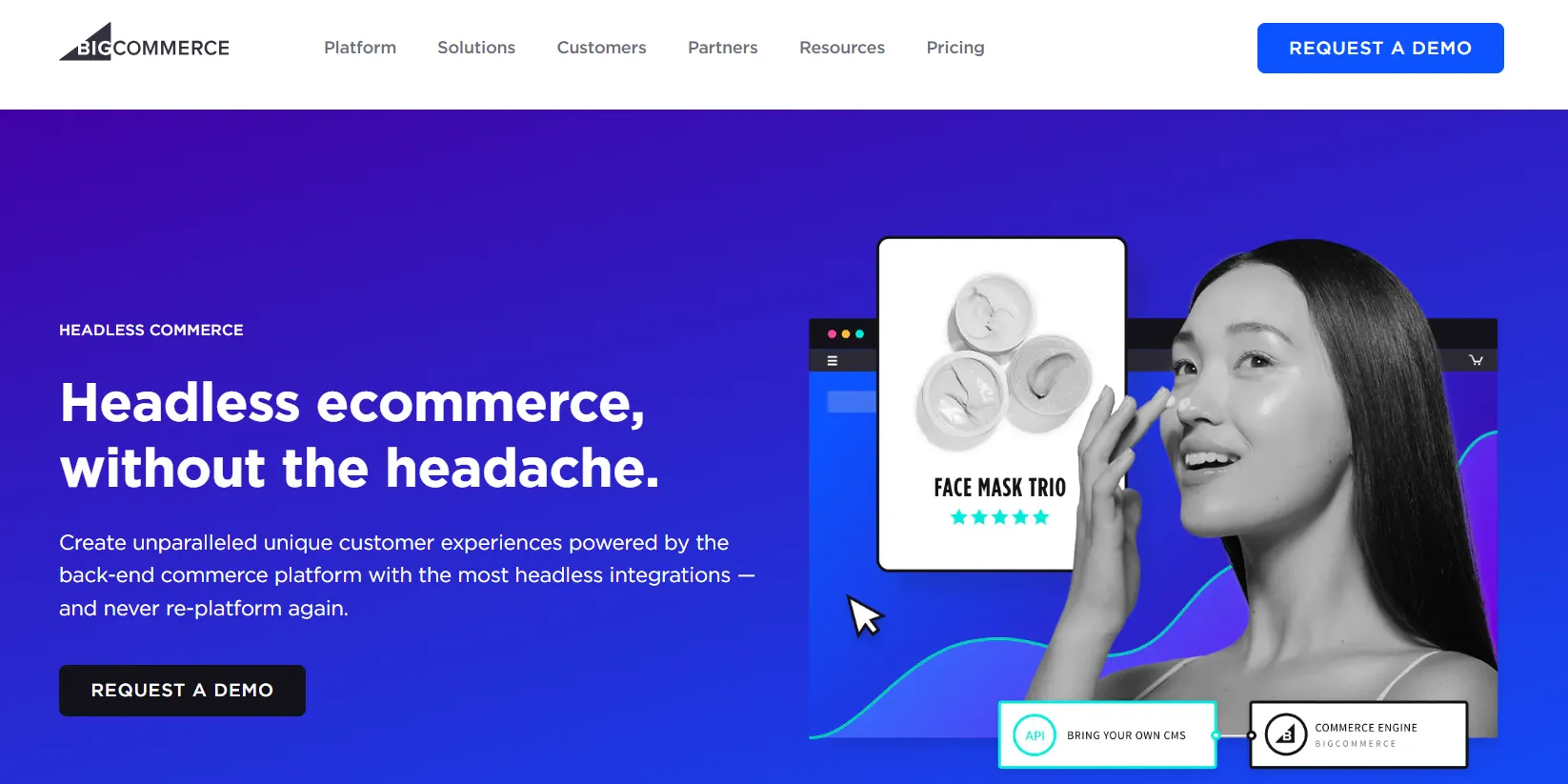
5. Modular
In short, modular commerce involves interconnecting various components or modules configured on the backend. Each function operates independently, allowing for easy swapping when upgrading or testing alternatives.
They utilize contemporary technologies and strategies such as MACH (Microservices, APIs, Cloud, and Headless) and Jamstack (JavaScript, APIs, and Markup). This blend of tools and methodologies empowers merchants to select optimal applications and services for their enterprises, avoiding vendor dependency.
These enterprise eCommerce solutions allow additional flexibility to enterprise brands, enabling the addition, extension, or replacement of functionalities with suitable code bases, APIs, apps, and services.
Popular platforms: Shopify Plus, fabric, etc.

Top 8 Enterprise eCommerce Platforms to Choose From
Now you have come across the part where you have to make the final decision. If you are sitting on the fence, we are here to help.
After 12 years of experience, we have had the chance to actually work with hundreds of eCommerce platforms. As a result, we were able to compare them and pick out the 8 best enterprise eCommerce platforms. Our assessment is conducted regarding the following aspects:
- Pricing;
- Ease of use;
- Flexibility;
- Scalability;
- Core features.
1. Shopify Plus
Opting for the Shopify enterprise platform is a wise choice given its status as one of the best eCommerce platforms. For enterprises, Shopify Plus is designed exclusively with even greater advantages. From what we have observed, its self-scaling architecture can handle Black Friday-level traffic year-round.
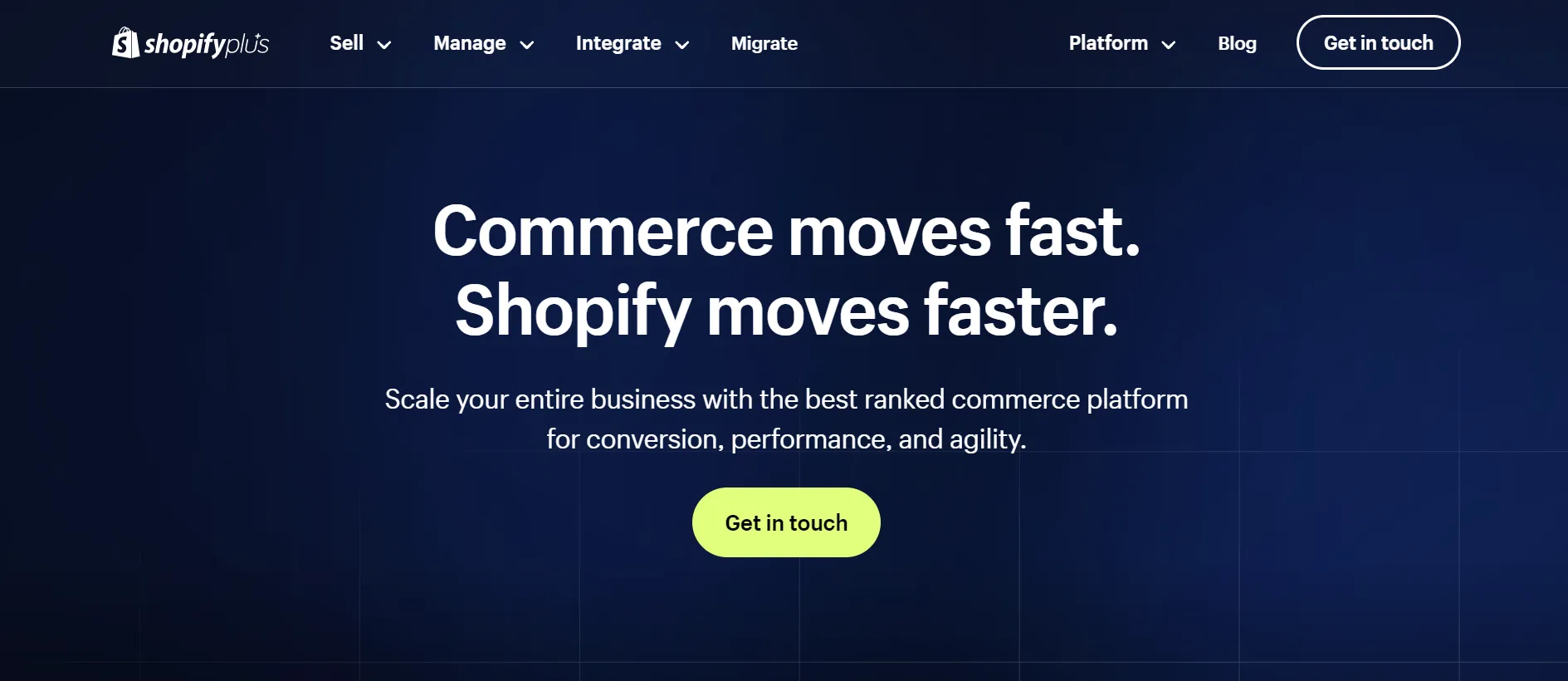
Starting at $2300/month for the first 3 years, Shopify Plus provides nearly limitless opportunities for customizing both the front-end store design and the back-end business workflows. This is quite an affordable range compared to the advanced features that come with it.
[wptb id=73029]
Learn the difference between Shopify vs Shopify Plus to see how it can surely optimize your enterprise.
2. Salesforce Commerce Cloud
Salesforce Commerce Cloud is a cloud-based commerce platform designed to empower large businesses with AI, data, and CRM capabilities, facilitating innovative and adaptable storefronts.
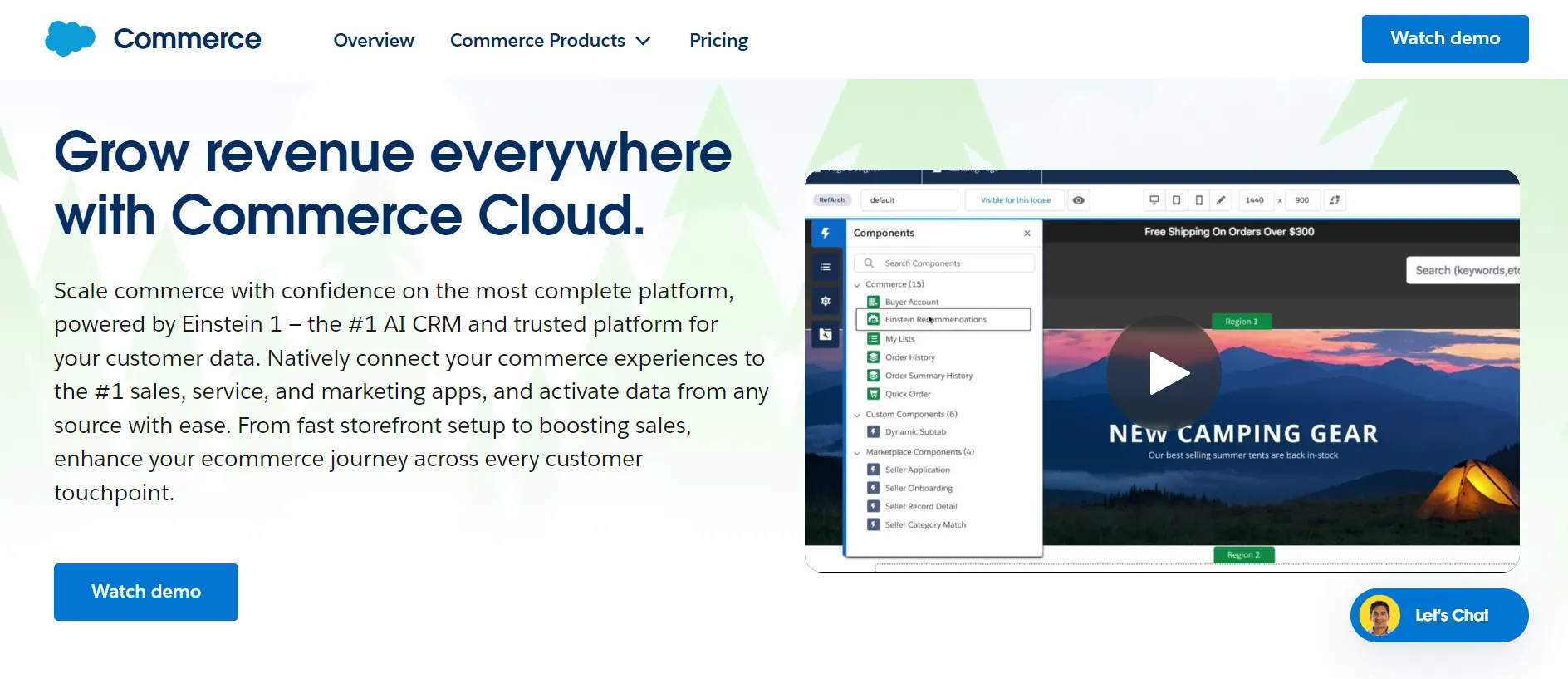
Its B2B Commerce solution is based on the Salesforce Lightning platform, utilizing modular components to offer commerce functionality across the digital product range. There are 2 pricing editions for you to choose from depending on your business needs:
- Starter: 1% Gross Merchandise Value
- Growth: 2% Gross Merchandise Value.
Compared to Shopify Plus, the total cost of running your enterprise on Salesforce is much more expensive.
[wptb id=73031]
3. BigCommerce Enterprise
Six years ago, BigCommerce began targeting larger businesses by introducing BigCommerce Enterprise, an enhanced SaaS offering packed with advanced features. We are appealing to its user-friendly dashboard, top-tier SEO capabilities, robust features, and lower total cost of ownership.
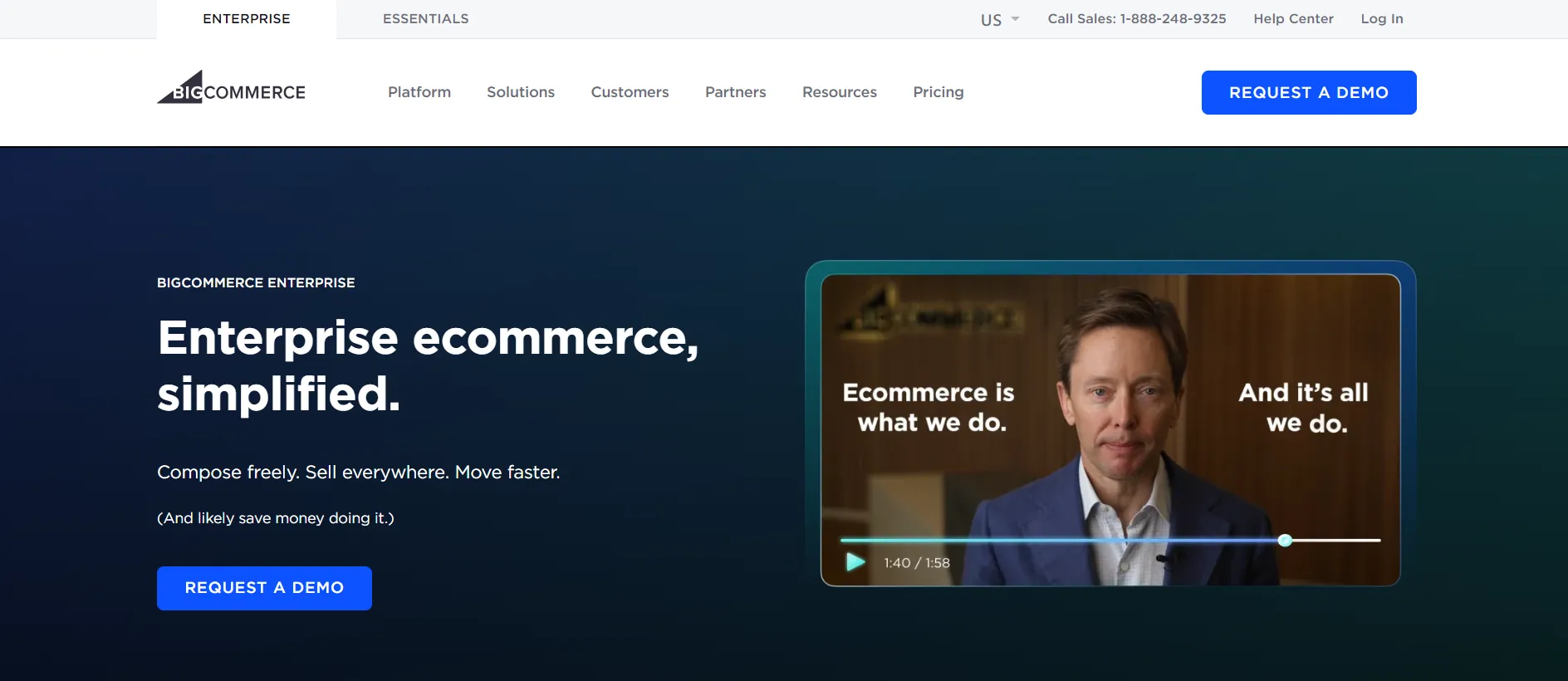
While the pricing may be higher than Shopify Plus – ranging from $1,000 to $15,000, you’ll gain access to exclusive features not available in any other BigCommerce plan. These include unlimited sales, the ability to create multiple storefronts, and extensive customization options.
Click to read our comprehensive comparison between Shopify Plus vs BigCommerce Enterprise.
[wptb id=73032]
4. Adobe Commerce (Magento)
Formerly recognized as Magento, Adobe Commerce stands out as a robust and versatile platform tailored to the demands of large-scale brands. It is constructed upon a scalable, open-source foundation, offering extensive options for customization alongside a thriving ecosystem of extensions and integrations.
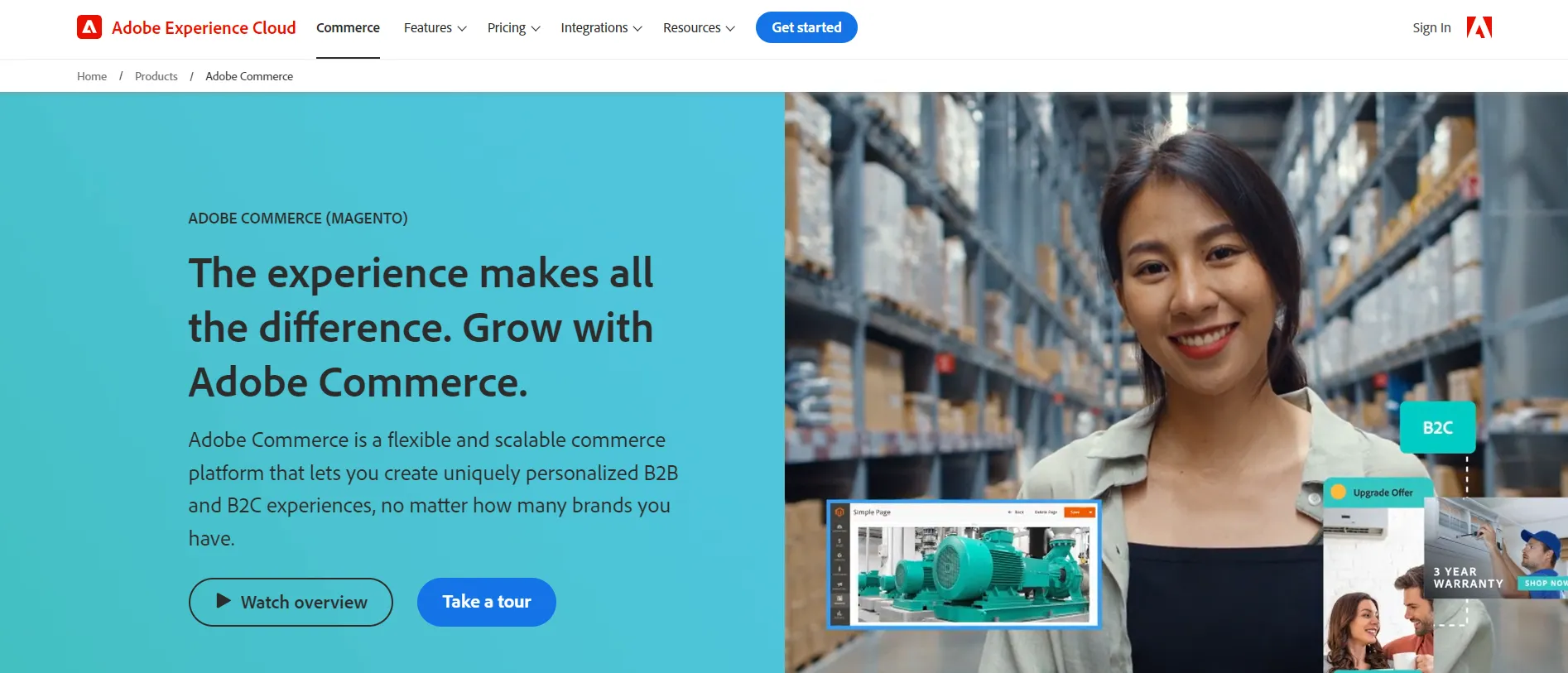
Adobe Commerce Pro serves as merchants’ comprehensive solution, while Managed Services delivers more expert-level support on hosted cloud infrastructure. However, the Managed Services come with a much higher cost than the Pro plan.
Managed Services offers the opportunity to reduce store disruptions by providing continuous monitoring support from Adobe Commerce professionals. Additionally, you can enhance your business performance with benefits such as dedicated escalation management, support for planning events management, etc.
Typically, the overall cost of Adobe Commerce can vary between $122,000 and $450,000 per year, depending on the workload and specific customizations required. For more details, refer to our Magento pricing analysis.
[wptb id=73033]
5. Woo Enterprise (WooCommerce)
WooCommerce has already been a familiar name among eCommerce merchants, thanks to its open-source core and customization capabilities on WordPress. And, they bring these advantages to even the next level with the Enterprise version.
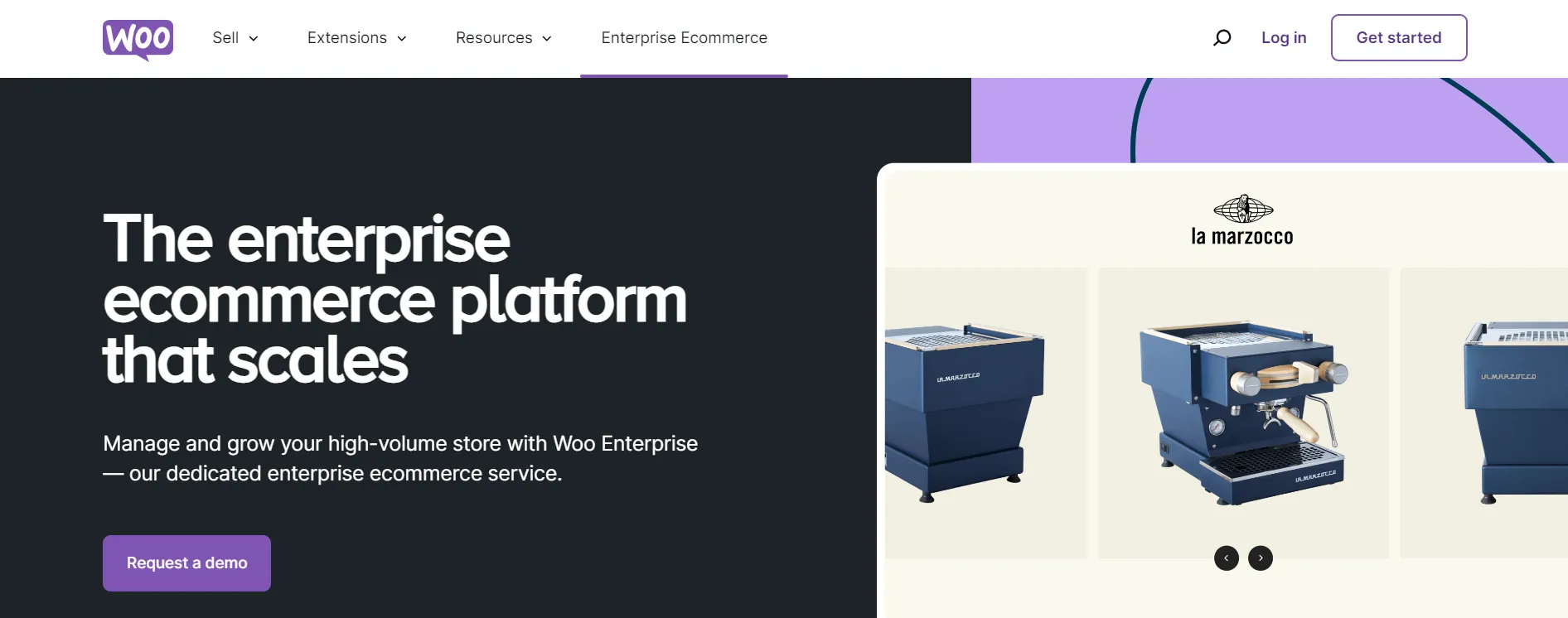
Based on your specific requirements and customization, you may have to pay between $5,000 and $25,000 for 5 websites. The highlight of this enterprise eCommerce platform is that you will be able to gain access to professional assistance and guidance. With complex systems and high stakes, this ensures minimal downtime and quick resolution of any issues, safeguarding your revenue and reputation.
[wptb id=73038]
6. Oracle Commerce
The Oracle Commerce Cloud caters to businesses of all sizes, offering omnichannel capabilities that enable the management of multiple sites under one subscription. It comes equipped with numerous built-in features, eliminating the need for additional expenses.
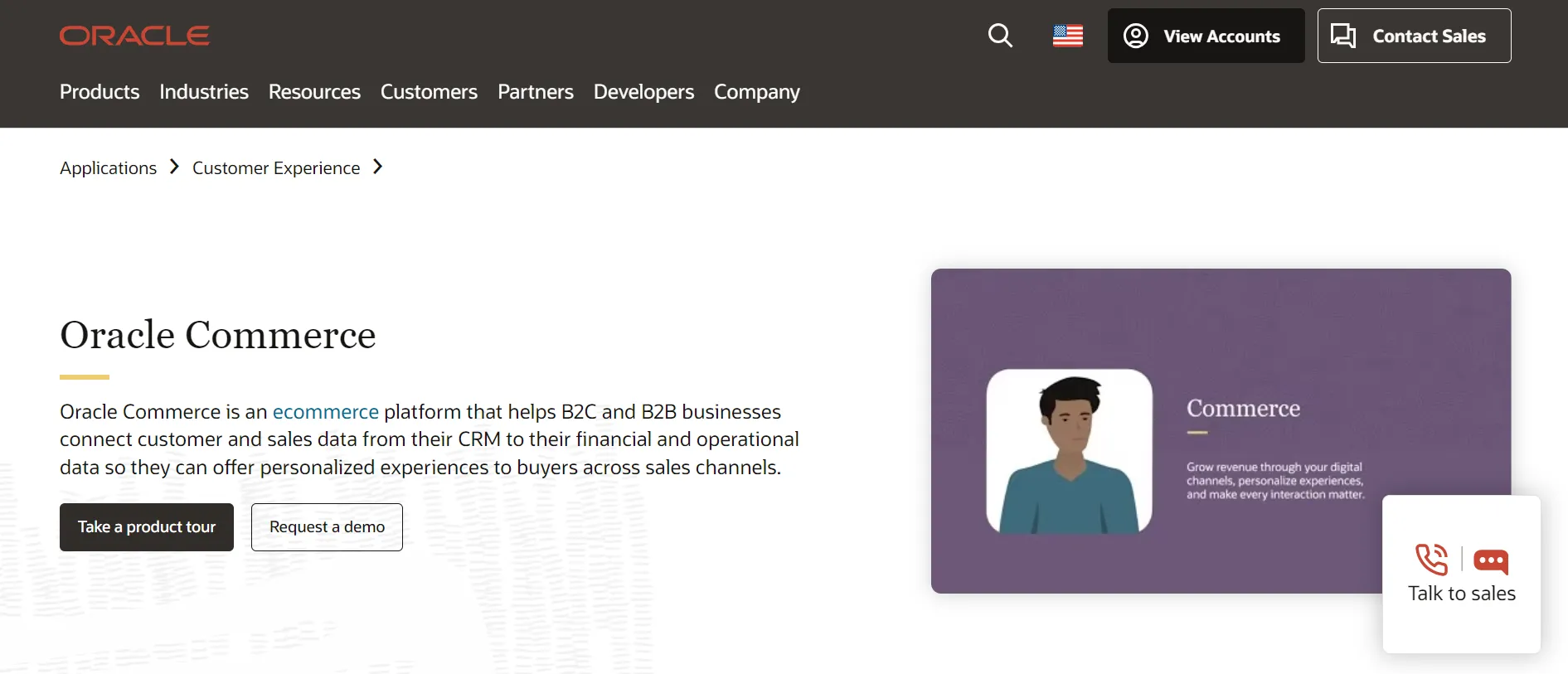
The pricing for Oracle Commerce fluctuates notably based on the selected features, deployment model (cloud or on-premise), and anticipated usage volume. The starting price for the basic cloud subscription is approximately $15,000 per month, supplemented by additional charges for transaction processing, storage, and customizations.
[wptb id=73039]
7. commercetools
Headquartered in Germany, with a global presence, commercetools is a cloud-native platform renowned for its flexibility, scalability, and seamless integration with existing systems.
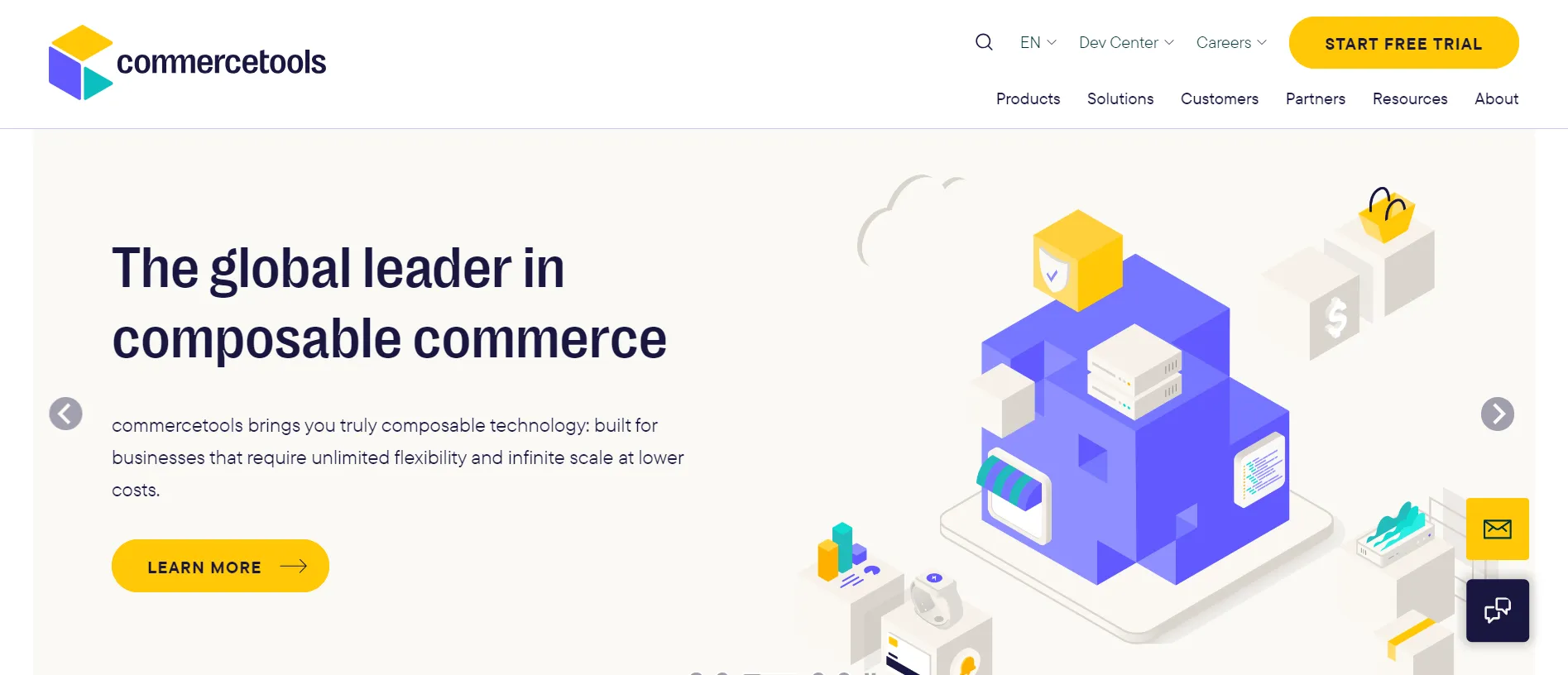
This is one of the enterprise eCommerce platforms that pioneered headless commerce and boasted key features, such as catalog management, unified cart, order management, machine learning, developer tools, etc.
One significant advantage and unique characteristic of commercetools is its pricing structure, which involves an annual fee along with pay-as-you-use charges for third-party services. More specifically, the annual fee is determined based on your revenue rate. This approach is very different from other alternatives.
[wptb id=73041]
8. SAP Commerce Cloud
SAP Hybris Commerce provides the option for on-premise hosting or deployment on cloud infrastructures, while the Commerce Cloud version specifically refers to its cloud-based offering.
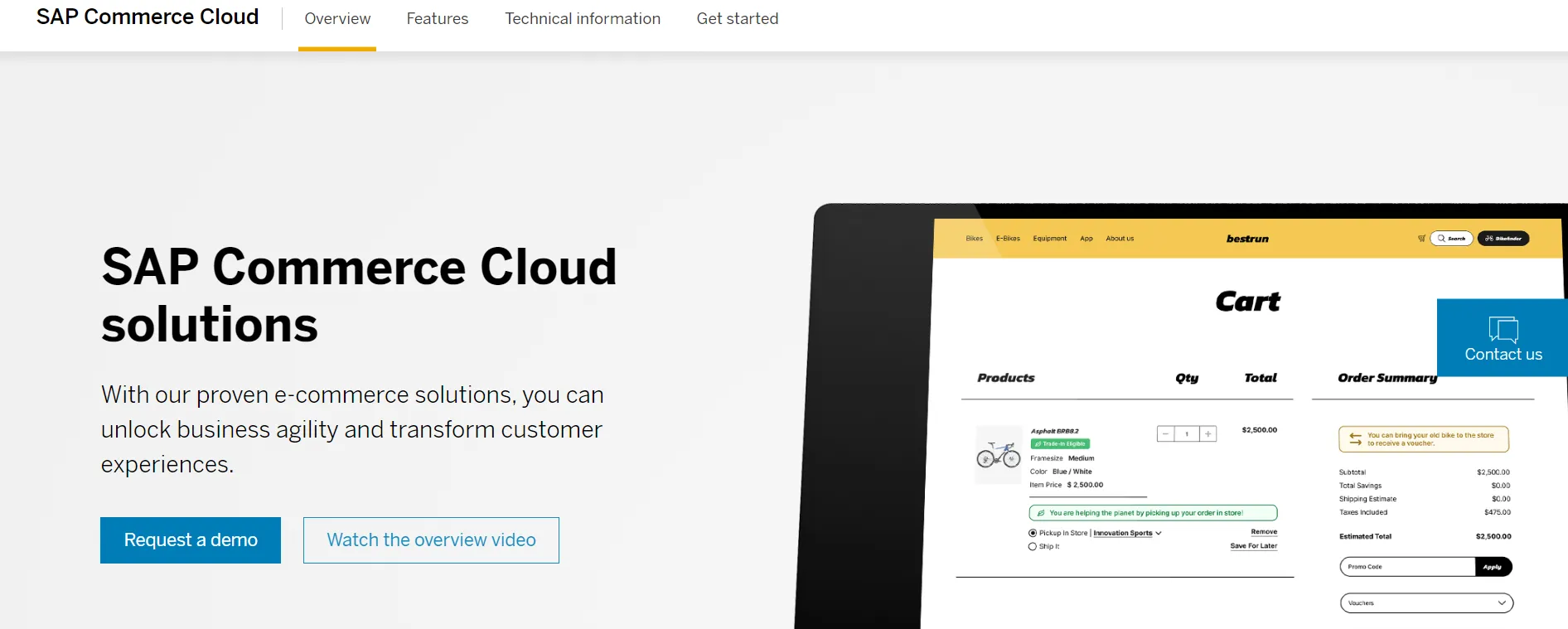
SAP Commerce Cloud (in conjunction with SAP Hybris) presents native functionalities designed to meet the needs of businesses with extensive international operations. These include support for multi-site setups, multilingual interfaces, and handling multiple currencies.
SAP does not publicly disclose pricing details for its base Commerce Cloud platform. However, it typically begins at a minimum of $100,000 per year, per license.
[wptb id=73042]
How to Choose The Best eCommerce Solution for Enterprise?
Identifying the optimal platform necessitates a meticulous assessment of your business needs, objectives, and financial resources. It’s crucial to anticipate future growth, prompting a thorough examination of these enterprise eCommerce platforms.
To save you time figuring out, we have outlined the steps on how to choose the best eCommerce solution for your enterprise. Keep scrolling for more details!
1. Outline business goals
Initially, outlining the business goals will help you know where you are heading. Each eCommerce company varies, spanning from size to the sector it serves. Thus, the business needs for the migrating-to platform will be different.
To do so, we recommend estimating your current platforms. You can conduct a SWOT analysis, which delves into the strengths, weaknesses, opportunities, and threats of your current technology stack. This will help define the criteria for your new platform as well as the project goals.
2. Identify necessary features
With your objectives and goals in mind, the next step is to assess the functionality necessary for growth. Here are the core features that you might want to consider:
- Website builder: Utilizing a website builder empowers you to establish and oversee your online store efficiently, ensuring optimization for both desktop and mobile users.
- Inventory management: An effective enterprise eCommerce platform streamlines inventory management by enabling real-time tracking of stock levels, ensuring perpetual inventory availability.
- Analytics and report: Tracking metrics such as conversion rates, average order values, and customer lifetime values allows for informed decision-making.
- Marketing: Features like coupons, abandoned cart emails, SMS text marketing, and pop-ups prove invaluable in this regard.
💡Our tips: It is best to differentiate between essential and desirable features, comparing potential solutions against the prioritized list.
3. Estimate the cost
Pricing fluctuates greatly among different tools and plans within specific enterprise eCommerce platforms. Based on the identified features previously, you can estimate the cost to see whether it aligns with your budget planning.
Besides the platform fee, pay close attention to other extra costs, including:
- Development;
- Hosting;
- Theme, and customization;
- Apps integration;
- Maintenance;
- Total cost of ownership (TCO);
- Migration (optional).
4. Choose a replatforming method
Once you’ve identified the enterprise eCommerce platform aligning with your organizational objectives, clarify the transition process. A migration strategy outlines the specifics of transitioning from your current platform to the new enterprise solution.
Currently, the 3 most popular methods for migration are:
- Manual method
This involves manually transferring data from your old platform to the new one. While this method provides full control over the migration process, it can be time-consuming and error-prone, especially for enterprises with extensive data.
- Hire a developer
Another option is to hire a developer to handle the migration process for you. They will customize the migration according to your specific requirements and ensure a smooth transition. However, this approach can be costly and may require ongoing support for maintenance and updates.
- Go for a migration service provider
Opting for a migration service provider like LitExtension is often the most efficient and hassle-free solution. We offer the #1 eCommerce migration service, with a long record of success by supporting hundreds of thousands of clients worldwide.
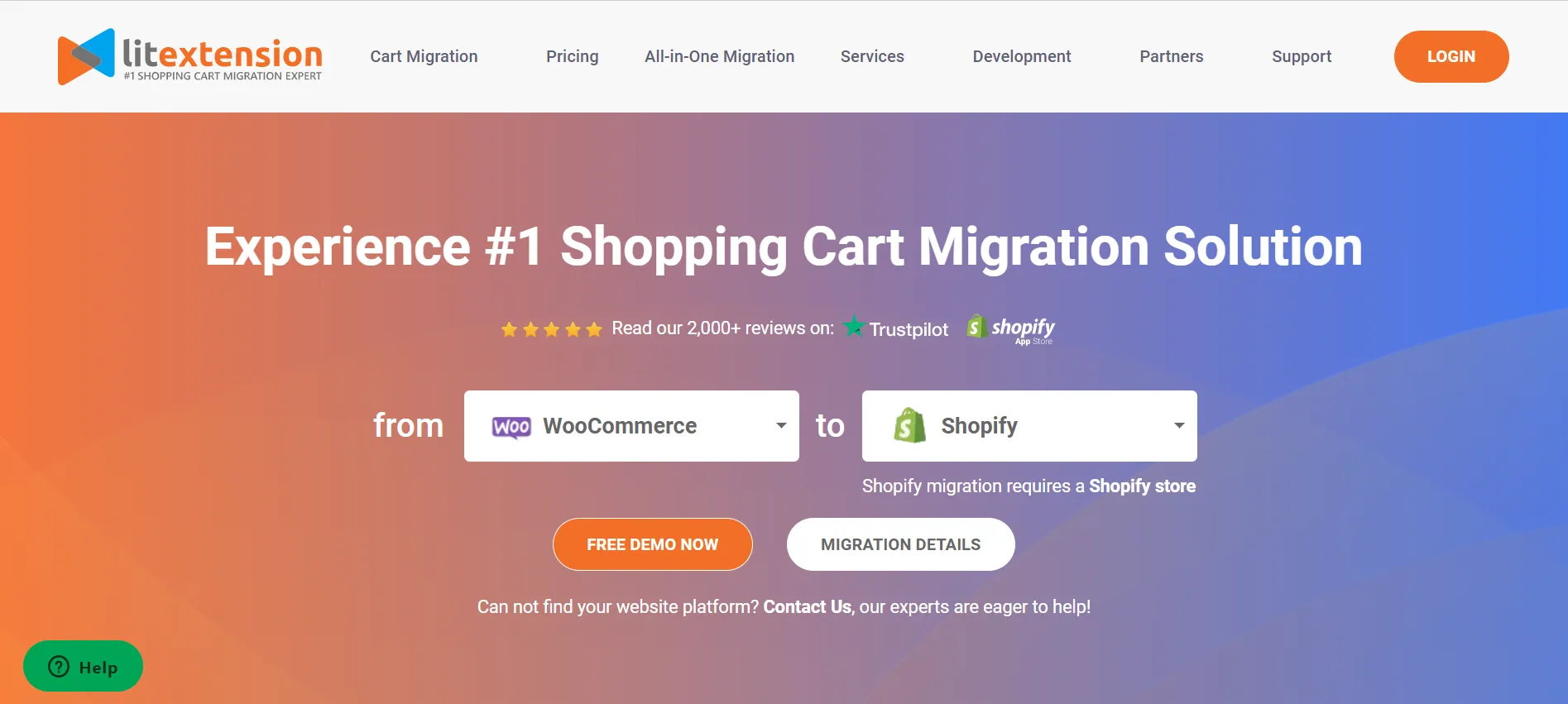
No matter the size of your database, we ensure the highest level of accuracy, security, and minimal downtime, allowing you to focus on other business aspects.
For Shopify Plus migration, we have a dedicated Personal Assistant (PA) to take care of the entire project from start to end. They are responsible for ensuring the best migration result as well as answering all of your questions during the process.
Enterprise eCommerce Platforms: FAQ
[sp_easyaccordion id=”73027″]
Key Takeaway
In conclusion, selecting enterprise eCommerce platforms is a pivotal decision for any business aiming to thrive. Each platform offers its own set of features, strengths, and considerations that must be weighed against your specific needs and goals.
Whether you opt for the comprehensive of Adobe Commerce, the flexibility of Shopify Plus, or any other platform, the key lies in aligning the platform’s capabilities with your business requirements. So, take your time, do your research, and choose wisely.
To grow your enterprise even further, head to our LitExtension blog or join the Facebook community group for more exclusive insights!